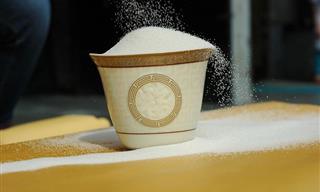How Can Baking Soda Reduce Inflammation?
You have probably heard about pH, or at least seen it on the packaging of body gels, soaps and facial cleansers. And while it is certainly true that pH balance is key to our skin’s health, we can generalize and conclude that it is crucial for keeping the entire body healthy.
For example, an overly acidic environment in the stomach after eating highly-acidic foods, such as citrus and tomatoes, can cause heartburn, and a chronically-high acidity in the stomach may even be the root of serious health conditions, such as gastritis, peptic ulcers and even stomach cancer.
While the neutral pH is 7 (the same as water), the normal pH in the various organs in your body is different, for example:
- the blood is slightly alkaline (7.35-7.45)
- the stomach being quite acidic (around 3.5).
Mind you that “balance” is the key word here, as both an overly acidic and overly alkaline pH for the specific organ or tissue in the body can lead to health issues. This means that healthy individuals are better off not messing with their pH, but the story is different for those who suffer from chronic inflammatory conditions, such as rheumatoid arthritis.
A study conducted by a team of researchers at Augusta University in Georgia showed that drinking baking soda mixed into water can make the environment in certain organs more alkaline. They found that this shift in the pH essentially “reprograms” the immune system to reduce inflammation in the body by stimulating a type of immune cells called macrophages to act as anti-inflammatory agents.
Researchers observed a switch in healthy human subjects from inflammatory actions to anti-inflammatory ones in the spleen, stomach, kidneys and peripheral blood vessels, so the baking soda treatment can potentially have a positive effect on a wide range of organs and tissues throughout the body.
Who Should Take Baking Soda and How?

Dylangrubb97/ Wikimedia Commons
People with chronic inflammatory diseases, such as rheumatoid arthritis, and some autoimmune disease can drink baking soda water to improve their symptoms, but there is a method to it.
Method: You should start from a very low dosage of baking soda - ⅛ teaspoon to a glass of water daily, and then gradually build up to a maximum of ¼ teaspoon per glass.
The required dose will vary for each person, and you will know that a dose is too high if you’re experiencing symptoms like shortness of breath and a racing heart. In that case, you have to lower the dose of baking soda. Conversely, if no such symptoms arise after drinking the baking soda solution, the dosage is probably fine for you.
Who Should Stay Away From Baking Soda Water?
Individuals who are at risk of alkalosis, a condition arising from the pH in the body becoming too alkaline, should stay away from baking soda water, as it can worsen their conditions. These individuals include people with certain lung, liver, and kidney conditions, as well as people taking certain medications, such as diuretics.
You should ALWAYS discuss any treatment or supplementation with your doctor before you start said treatment, as it may interact with your medications and seemingly-unrelated health conditions in unexpected ways.
 Go to BabaMail
Go to BabaMail


























